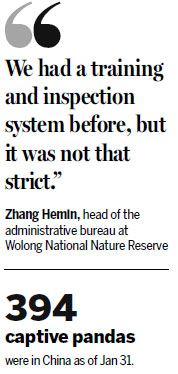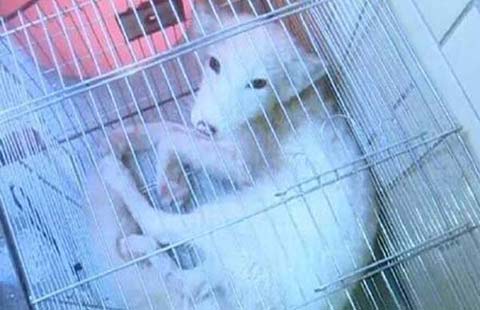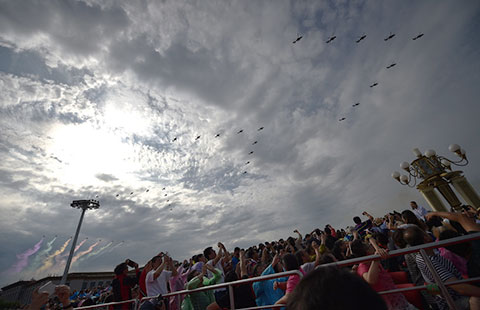Pandas not visitors' pets, experts say
By Huang Zhiling in Chengdu and Su Zhouin Beijing (China Daily) Updated: 2015-07-28 07:54The forestry administration introduced the first regulations on the giant panda leasing system in 2011, outlining how to lease and care for the animals.

Zoos need approval from local forestry authorities and must prove they can look after the animals. Teams of experts are sent to investigate qualifications, and cubs under the age of 2 and wild giant pandas may not be leased.
Tang Chunxiang, a member of such a team, told Sanlian Life Weekly that zoos prepare on many levels. The temperature-controlled den must be at least 100 square meters and the panda's outdoor environment must include entertainment, plants and pools.
The panda's diet is also important and the zoo must have different types of bamboo, fruit and other food. Zookeepers and veterinarians must be trained.
"A zoo has to invest about 1 million yuan ($161,000) on hardware and software in the beginning and about 150,000 yuan every year for daily maintenance," Tang said.
Overall care has been a problem at some zoos, with panda deaths reported in past years in Shijiazhuang, Hebei province, Nanjing, Jiangsu province and Jinan in Shandong province.
In May last year, the forestry administration conducted a nationwide inspection of the panda leasing system and found many problems. Some leases were halted as the animals were being displayed inappropriately or were being exploited to make money.
This June, the administration said that strict inspections and supervision of the pandas' conditions should be introduced, and zoos should not profit by allowing photos to be taken with pandas.
Zhang Hemin, head of the administrative bureau at the Wolong National Nature Reserve, said, "There is a set procedure to follow, but we have seen violations where the enclosure, keeper, veterinarian or food supply chain did not meet the required standards."
He said there were cases of zoos outsourcing pandas to private companies for profit, but this was stopped after the inspections.
"Now zoos applying to borrow pandas will have to send their keepers and veterinarians to Wolong for three months' training, and the reserve will send inspection teams to the zoos every year," he said. "We had a training and inspection system before, but it was not that strict."
Two pandas loaned to a domestic zoo could pull in as much as 600,000 yuan a year, he said.
"But pandas are seen as the flagship of global wildlife protection efforts. They are supposed to have a positive impact, promoting awareness, knowledge and concepts in terms of wildlife and environmental protection," Zhang said. "Leasing pandas must focus on the public interest."
Contact the writers at huangzhiling@chinadaily.com.cn and suzhou@chinadaily.com.cn
- Delegation salutes Tibet anniversary
- Officials are told to act as anti-graft watchdogs
- Great Wall safeguarded in united action
- Vice minister pledges more efforts to improve air quality
- Beijing’s efforts to control air pollution start to pay off
- China's military committed to reform
- Netizens rip singer over baby photos
- Central govt's growing support for Tibet
- Monument to be built on Tianjin blast site
- China and Russia seal raft of energy deals







